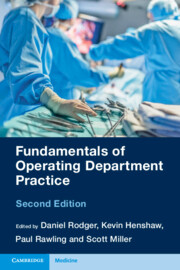Book contents
- Fundamentals of Operating Department Practice
- Fundamentals of Operating Department Practice
- Copyright page
- Contents
- Contributors
- Foreword
- Chapter 1 The Caring Perioperative Practitioner
- Chapter 2 Evidence-Based Operating Department Practice
- Chapter 3 Healthcare Ethics and Professional Regulation in Operating Department Practice
- Chapter 4 Operating Department Practice and the Law
- Chapter 5 Health and Safety in the Perioperative Environment
- Chapter 6 Fundamentals of Operating Department Design
- Chapter 7 Fundamentals of Infection Prevention and Control in the Operating Department
- Chapter 8 Fundamentals of Cardiovascular Physiology
- Chapter 9 Recognition and Interpretation of the Electrocardiogram
- Chapter 10 Fundamentals of Respiratory Physiology
- Chapter 11 Introduction to General Anaesthesia
- Chapter 12 Fundamentals of Airway Management
- Chapter 13 Artificial Ventilation
- Chapter 14 Management of Perioperative Medical Emergencies
- Chapter 15 Total Intravenous Anaesthesia
- Chapter 16 Fundamentals of Basic Patient Monitoring
- Chapter 17 Haemodynamic Monitoring
- Chapter 18 Fundamentals of Regional Anaesthesia
- Chapter 19 Fundamentals of the Anaesthetic Machine
- Chapter 20 Anaesthetic Breathing Systems
- Chapter 21 Pharmacological Agents in Anaesthetic Practice
- Chapter 22 Fundamentals of Emergency Obstetric Care
- Chapter 23 Care of the Bariatric Patient
- Chapter 24 Fundamentals of Decontamination and Sterilisation
- Chapter 25 Management and Use of Medical Equipment
- Chapter 26 Fundamentals of the Surgical Scrub Role
- Chapter 27 Fundamentals of Patient Positioning for Surgery
- Chapter 28 Fundamentals of Perioperative Thermoregulation
- Chapter 29 Fundamentals of Fluid and Electrolyte Balance during Surgery
- Chapter 30 The Physiology of Blood and Its Administration
- Chapter 31 Fundamentals of Wound Healing, Dressings, and Drains
- Chapter 32 Understanding Sutures and Skin Closure
- Chapter 33 Perioperative Care of the Paediatric Patient
- Chapter 34 Perioperative Pain Management
- Chapter 35 Recovery of Patients from Anaesthesia and Surgery
- Chapter 36 The Fundamentals of Emergency Resuscitation
- Chapter 37 Human Factors, Ergonomics, and Non-technical Skills
- Chapter 38 Understanding Intraoperative Death
- Chapter 39 Extended and Advanced Roles in Perioperative Practice
- Index
- References
Chapter 17 - Haemodynamic Monitoring
Published online by Cambridge University Press: 18 August 2022
- Fundamentals of Operating Department Practice
- Fundamentals of Operating Department Practice
- Copyright page
- Contents
- Contributors
- Foreword
- Chapter 1 The Caring Perioperative Practitioner
- Chapter 2 Evidence-Based Operating Department Practice
- Chapter 3 Healthcare Ethics and Professional Regulation in Operating Department Practice
- Chapter 4 Operating Department Practice and the Law
- Chapter 5 Health and Safety in the Perioperative Environment
- Chapter 6 Fundamentals of Operating Department Design
- Chapter 7 Fundamentals of Infection Prevention and Control in the Operating Department
- Chapter 8 Fundamentals of Cardiovascular Physiology
- Chapter 9 Recognition and Interpretation of the Electrocardiogram
- Chapter 10 Fundamentals of Respiratory Physiology
- Chapter 11 Introduction to General Anaesthesia
- Chapter 12 Fundamentals of Airway Management
- Chapter 13 Artificial Ventilation
- Chapter 14 Management of Perioperative Medical Emergencies
- Chapter 15 Total Intravenous Anaesthesia
- Chapter 16 Fundamentals of Basic Patient Monitoring
- Chapter 17 Haemodynamic Monitoring
- Chapter 18 Fundamentals of Regional Anaesthesia
- Chapter 19 Fundamentals of the Anaesthetic Machine
- Chapter 20 Anaesthetic Breathing Systems
- Chapter 21 Pharmacological Agents in Anaesthetic Practice
- Chapter 22 Fundamentals of Emergency Obstetric Care
- Chapter 23 Care of the Bariatric Patient
- Chapter 24 Fundamentals of Decontamination and Sterilisation
- Chapter 25 Management and Use of Medical Equipment
- Chapter 26 Fundamentals of the Surgical Scrub Role
- Chapter 27 Fundamentals of Patient Positioning for Surgery
- Chapter 28 Fundamentals of Perioperative Thermoregulation
- Chapter 29 Fundamentals of Fluid and Electrolyte Balance during Surgery
- Chapter 30 The Physiology of Blood and Its Administration
- Chapter 31 Fundamentals of Wound Healing, Dressings, and Drains
- Chapter 32 Understanding Sutures and Skin Closure
- Chapter 33 Perioperative Care of the Paediatric Patient
- Chapter 34 Perioperative Pain Management
- Chapter 35 Recovery of Patients from Anaesthesia and Surgery
- Chapter 36 The Fundamentals of Emergency Resuscitation
- Chapter 37 Human Factors, Ergonomics, and Non-technical Skills
- Chapter 38 Understanding Intraoperative Death
- Chapter 39 Extended and Advanced Roles in Perioperative Practice
- Index
- References
Summary
Critical ill patients are often haemodynamically unstable and accurate continuous monitoring is vital. Haemodynamic monitoring describes the measurement of the cardiovascular stability of the patient. Invasive blood pressure monitoring and central venous pressure monitoring provide a ‘real time’ measurement of the patients haemodynamic status and better allows clinicians to pre-emptively treat a patient before a more serious problem arises. Although invasive blood pressure monitoring has several advantages compared to non-invasive blood pressure monitoring, it is not without risk. Central venous pressure monitoring is similarly beneficial in that it supports the clinical decision making regarding a patient’s fluid status but also comes with additional risks. This chapter explores invasive blood pressure and central venous pressure monitoring in detail.
Keywords
Information
- Type
- Chapter
- Information
- Fundamentals of Operating Department Practice , pp. 180 - 190Publisher: Cambridge University PressPrint publication year: 2022
